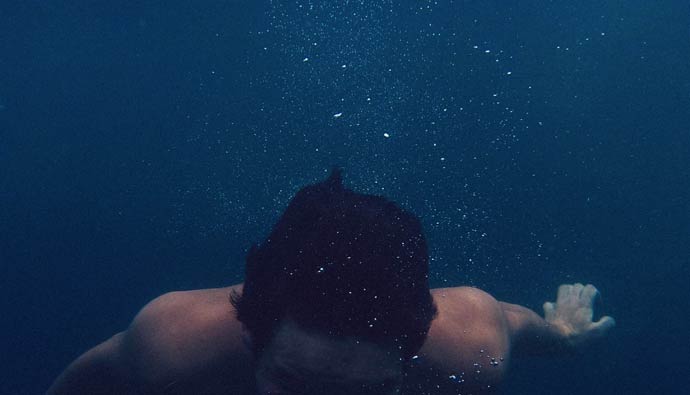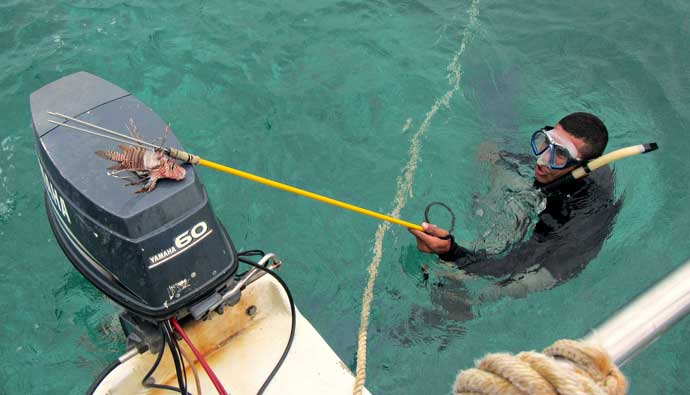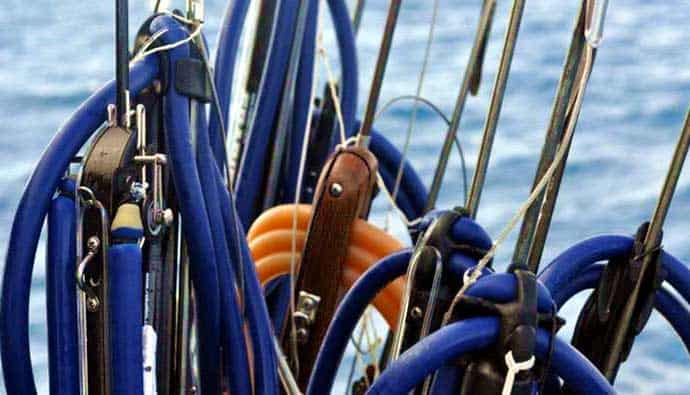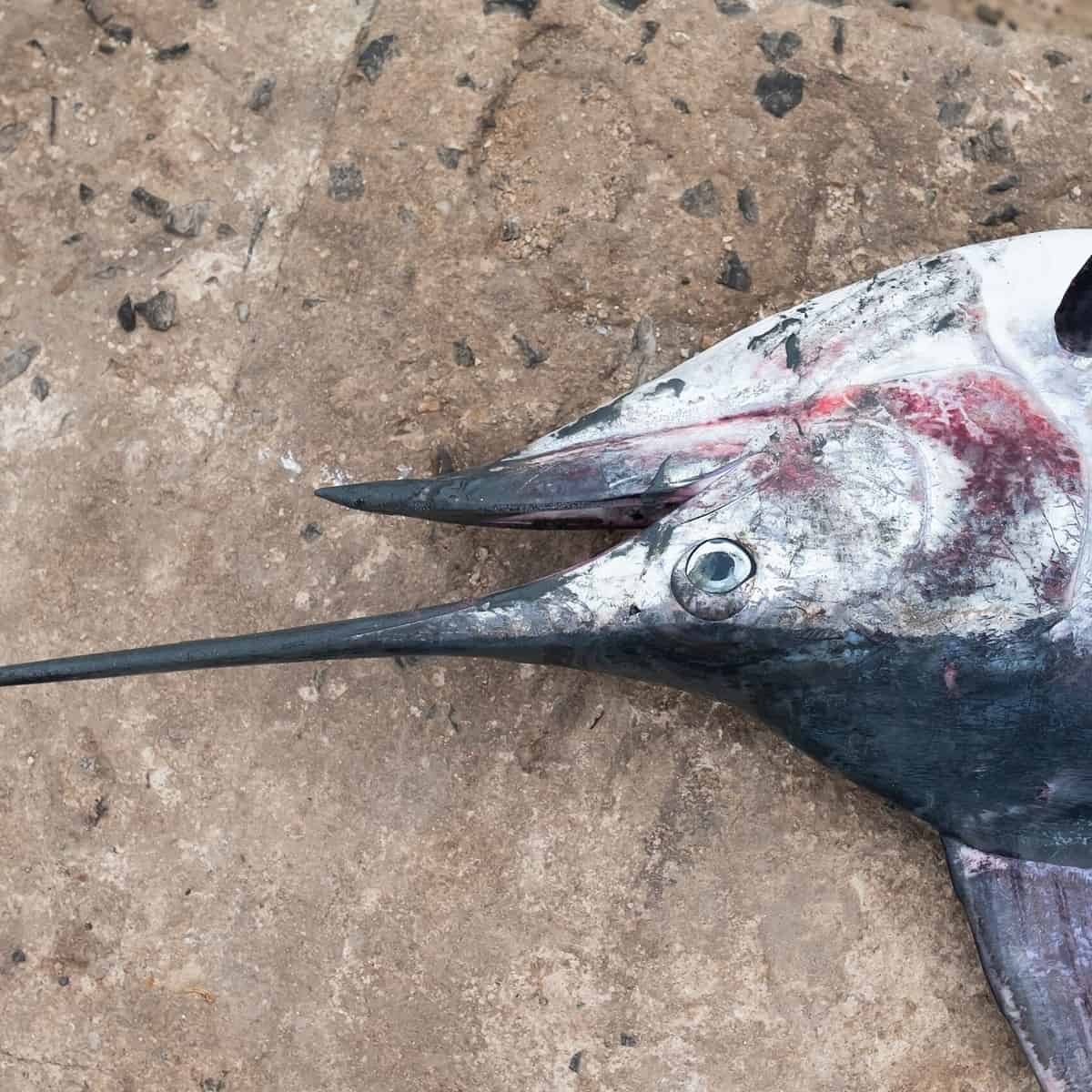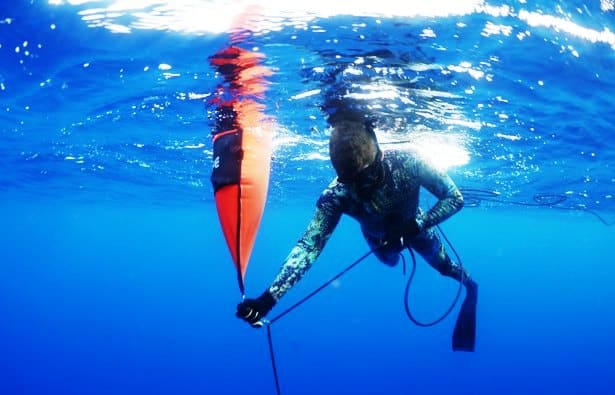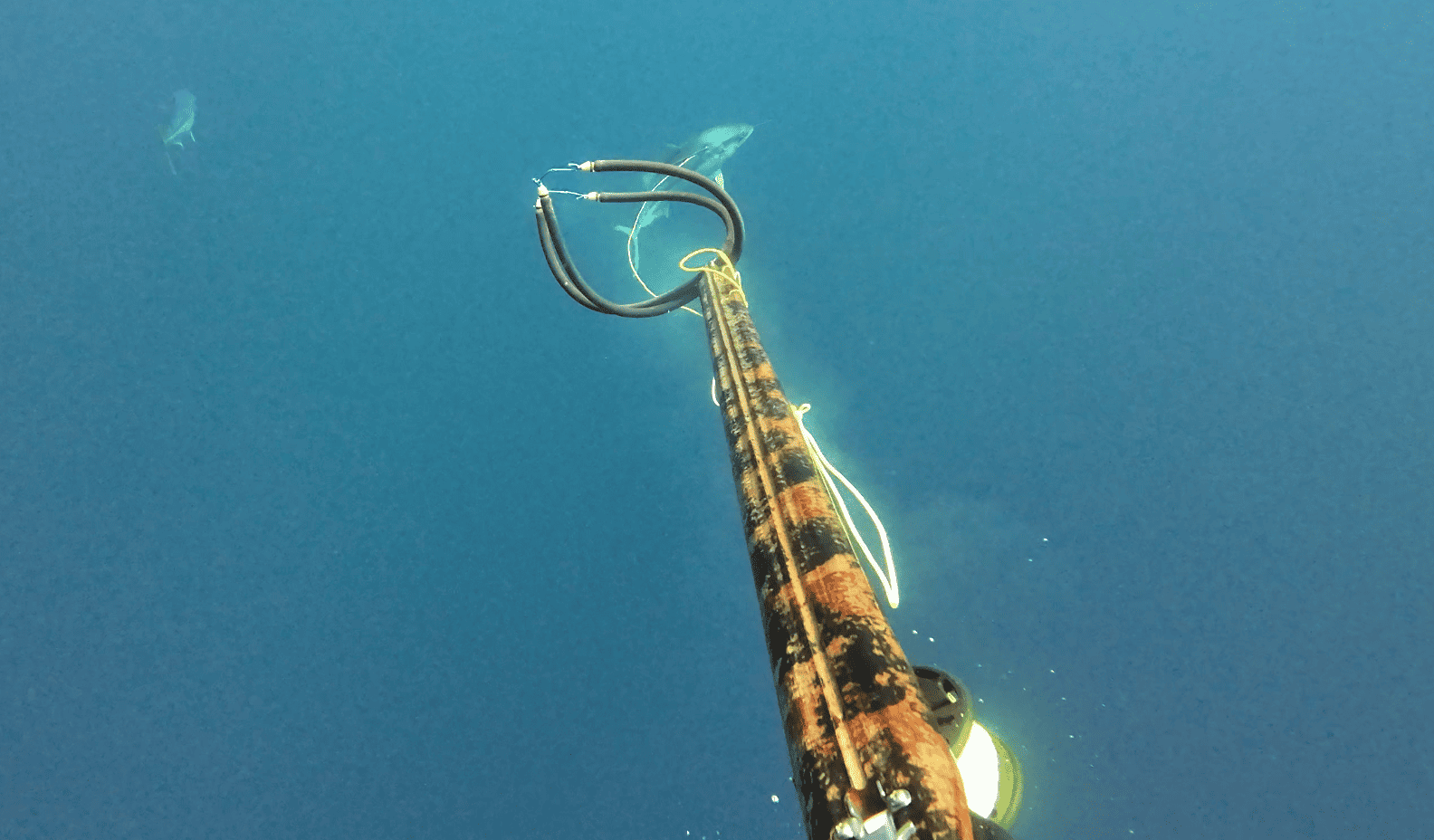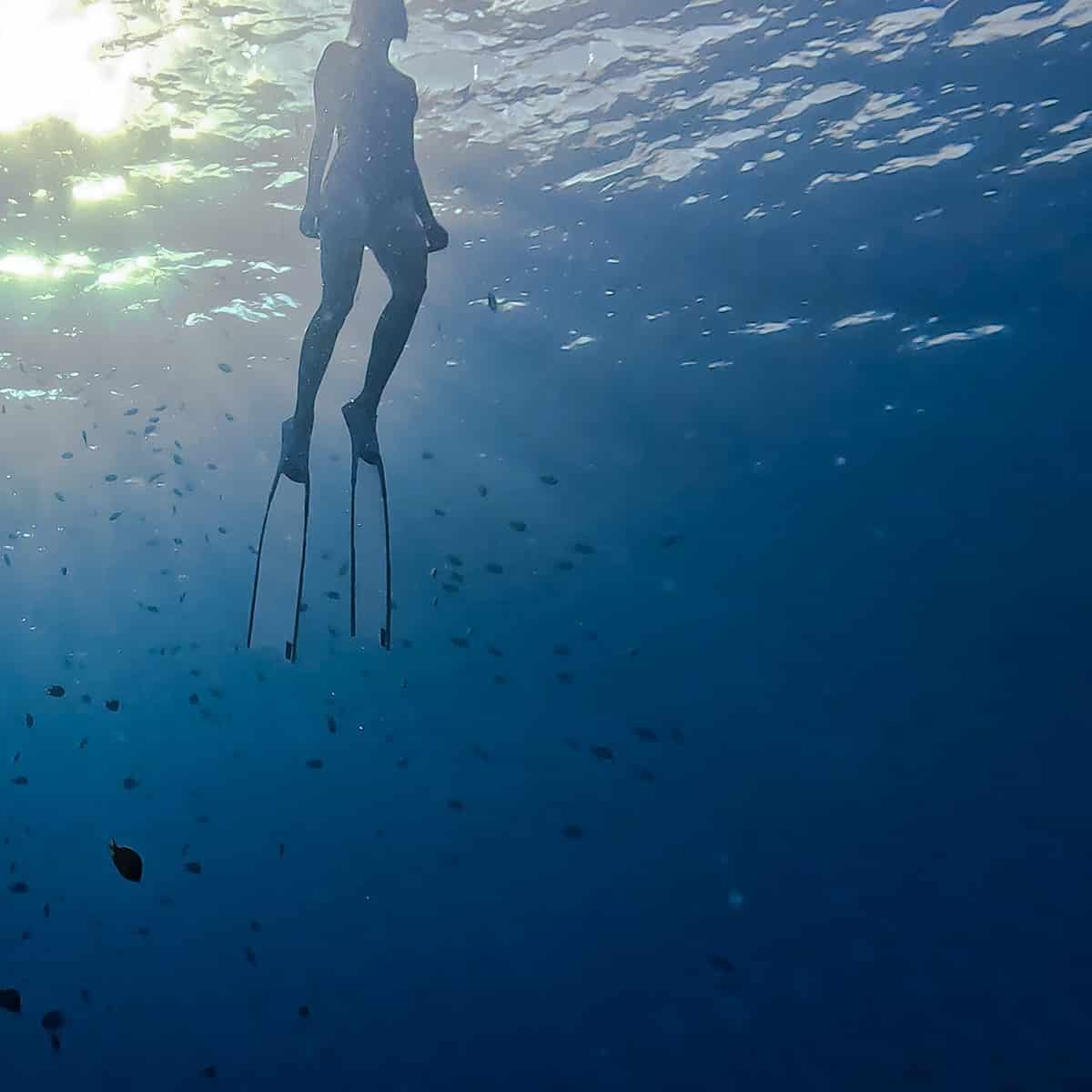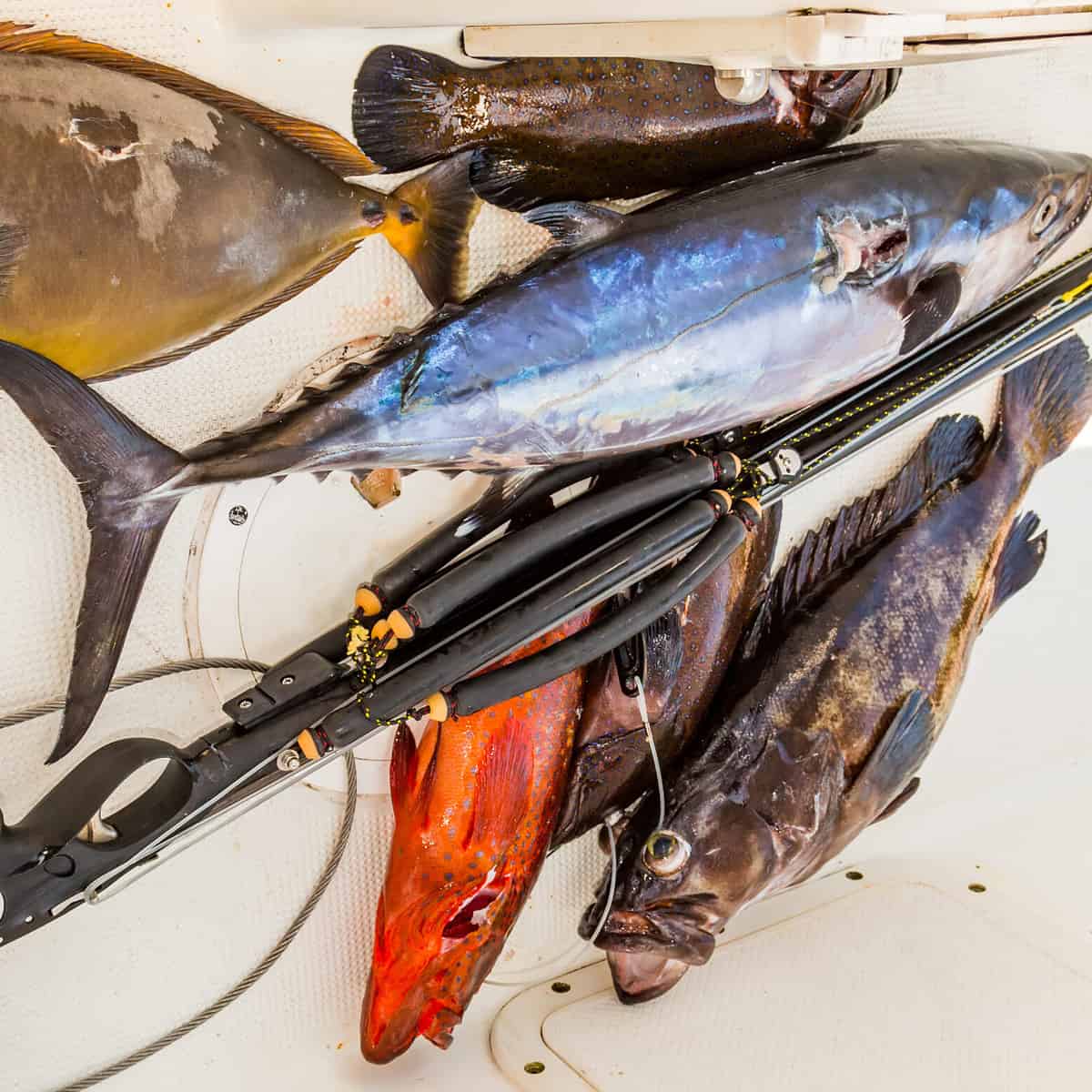You’ll find a breathtaking world teeming with life beneath the ocean’s surface – from stunning coral reefs and colorful fish to sprawling underwater landscapes.
But exploring this vast and mesmerizing underwater realm takes careful planning and preparation, especially when diving for fish.
Our expert Dr. Daniele Abela, an experienced diver from New England, said, “A lot of the good diving where I live is in Rhode Island, which is about a two-hour drive from where I live in Boston. So, if I’m going to be making that drive, I want to make sure that my dive will be successful. So, a lot of planning goes into my diving.”
This article will explore why planning your dives is essential to getting the most out of your underwater adventures.
Listen to more diving tips on the Cast & Spear Podcast
How to Plan Your Dive
It is always best to plan your dive before getting in the water. This will help ensure that you have a safe and enjoyable experience.
There are many factors to consider when planning a dive, including the depth of the dive, the time of day, the weather conditions, and the type of dive you want to do.
Depth
The dive depth is one of the most important factors to consider when planning a dive. The deeper you go, the more dangerous it becomes.
You need to be aware of your limitations and plan accordingly. If you are not comfortable diving to great depths, then don’t. There is no shame in staying shallow. It is better to be safe than sorry.
Time of Day
The time of day can also affect your dive. If you are diving in the daytime, there is usually more visibility. However, while diving at night, you need to use a flashlight.
Night dives can be more dangerous because it is harder to see what is around you.
“You’re going to a certain spot looking for a certain type of fish, but you know, that the condition that day, the visibility’s only going to be five feet, and all fish are going to be held up. You might bring two short guns. Cause you know, if you have a long gun, you won’t shoot anything ’cause you’re not going to see any fish,” said Dr. Abela.
Weather Conditions
You should also take the weather conditions into account when planning your dive. If there is a lot of wind or rain, diving can be more complex and even dangerous. Be sure to check the forecast before heading out on your dive.
Type of Dive
Finally, you should think about the type of dive you want to do. There are many different dives, including deep dives, wreck dives, and cave dives. Each type has its risks and challenges that you should know before getting in the water.
Get a Dive Plan
Once you have considered these factors, it is time to get a dive plan. You can create a dive plan yourself or get one from a diving instructor. A dive plan will help you stay safe and make the most of your dive.

Why It Is Essential to Plan for Your Dive
There are many reasons why planning for your dive is a must. They include:
Ensure Your Safety
Safety is always the number one priority when diving. By taking the time to plan your dive, you can help ensure that you and your dive buddy are safe throughout the entire experience.
Ensure that you have everything you need to keep yourself comfortable and safe, such as a diving wetsuit (here’s our list of the best women’s wetsuits), tank, regulator, etc. Forgetting something important could put your safety at risk, so it’s always best to plan.
Get the Most Out of your Dive
When you have a good plan in place, you can focus on enjoying yourself and experiencing all that diving offers. This means you can take in your surroundings, explore new areas, and seek hidden treasures.
A good dive plan also allows you to adjust if unexpected circumstances arise, such as changing weather conditions or an injury. By being fully prepared, you’ll be able to maximize your time under the water and make the most of every dive.
Avoid Any Issues or Problems
You’ve probably heard the saying that an ounce of prevention is worth a pound of cure. This is true for diving, as any problems or issues can quickly turn your dive from fun and exciting into something stressful and unpleasant.
You can avoid many potential problems and ensure your dive goes smoothly by planning. This could include anything from bringing the right gear and equipment to choosing a dive site appropriate for your level of experience.
“There’s also been plenty of times where I leave my dive gear down there. There have been times when I drive two hours home, and then I get back home, and I realize I forgot my fins down there. I’m not going to leave behind a pair of fins.”
“I have to drive two hours back down to grab them and then two hours back to my house. That stuff just makes or breaks you, but there’s nothing more demotivating or something that’ll steer you away from diving than having stuff like this happen. It’ll just push you away from doing something that you love,” according to what Dr. Daniele experienced.
Have a Great Time
Diving should be fun, and by planning, you can make sure you have a great time each time you take the plunge. Through careful preparation and planning, you can set yourself up for a diving adventure that is safe, exciting, and enjoyable.
Dr. Abela said, “If you can just have a system to make sure that all the little things get taken care of, it’ll just make diving, in general, more sustainable in the long term, and it’ll make you enjoy it a little bit more.”
The Benefits of Planning Your Dive
Planning can make all the difference between a safe and successful dive and a dangerous one when it comes to diving. Here are some of the benefits of planning your dive.
Being More Prepared
When you plan your dive, you’ll have a better understanding of what to expect. This knowledge will help you mentally and emotionally prepare for your dive.
You’ll know what the conditions are likely to be and what challenges you might face. This way, you can get mentally prepared for what’s to come, which will make it easier to focus on the task at hand.
Staying Safe
The more you plan your dive, the safer you’re likely to be. By understanding all of the critical details about your dive site and your equipment before getting in the water, you’ll have a better chance of avoiding any accidents or potential problems.
Staying Organized
When you’ve planned your dive in detail, you’ll know what to bring and where everything will go. This will help you stay organized before, during, and after the dive so that you don’t have to waste time looking for things or trying to remember where you put something.
Saves Time
Time is of the essence when you’re diving. You can save time on things like equipment checks and safety briefings by planning your dive. This way, you’ll have more time to enjoy your dive and explore all the underwater world offers.
Dr. Daniel Abela said, “If I only brought one gun and then that gun fails, it’s a two-hour drive for me to go home. And I got a little obsessive about it, but I started leaving backup gear in my car at all times so that I know that if my mask strap breaks, I have a backup mask in my car.”
Sharing the Experience
There’s nothing better than sharing a unique and exciting experience with others. Planning your dive can help you share your dive with family members, friends, or other divers who might want to join you on the adventure.
Learning
You can never know too much about diving. By taking the time to plan your dive, you can keep learning about different dive sites, safety procedures, and equipment options.
This knowledge will come in handy the next time you go diving, and it might even help you out of a dangerous situation one day.
“It comes with experience knowing what conditions, what fish are going to be or what type of life is going to be around at certain spots at certain seasons, for example now in January, the only fish that sort of sticks around in divable conditions right now that fit issues out of season.” Dr. Daniele Abela, our expert, said.
How to Choose the Right Equipment for Your Dive
The right equipment is a critical component of every dive, so you need to choose the right equipment to ensure that you are ready and prepared. Here are things to consider when choosing equipment.
Your Experience Level
The first thing you need to think about when choosing the right equipment for your dive is your experience level. For example, if you are a beginner, you will want to focus on finding more straightforward gear to use.
Think About What Kind of Fish You’re Hunting
The kind of fish you’re hunting will also play a role in what kind of equipment you need. If you’re planning on hunting smaller fish, you won’t need as much gear as someone planning to hunt larger fish.
Dr. Daniele Abela said, “Once you have a target species, you have a target spot that you want to go to. You have to organize your gear to make sure that you have a successful dive.”
Make Sure You Have the Right Size Gear
You also need to make sure that you have the right size gear. If you’re too small for your equipment, it will be more challenging to use, and you won’t be as effective in hunting fish.
“You have to organize your gear, too, to ensure that you have a successful dive,” Dr. Daniele Abela said.
Consider the Conditions of the Water
The conditions of the water you’ll be diving in will also play a role in what gear you need. If the water is very cold, you will want to consider getting insulated gear that can keep you warm underwater. While if it’s hot, the opposite is true – you’ll want gear that will keep you cool.
“Another thing you have to think about is knowing the water temperature. So my principle, my philosophy is that if you’re too hot, you can always fix it,”
Dr. Daniele Abela continues, “You can always let a little water into your wet suit. If you’re too cold or screwed, you can’t do anything to make yourself warmer. So my principle is always, if I’m debating, say, am I going to use a seven-mil wetsuit today or a five-mil wetsuit? If that debate is always in your mind, always just go a little bit thicker.”
Choose Durable Gear
Finally, you also want to ensure that the gear you choose is durable and can withstand the conditions of the water you’ll be diving in. You don’t want your equipment to break or fall apart while in the water.
What to Do If You Run into Problems While Diving
Spearfishing can be a great way to get up close and personal with the creatures of the deep, but it can also be a bit dangerous. If you run into any problems while diving, here are a few tips on what to do:
Don’t Panic
You should stay calm and focused if you encounter any problems underwater. Being calm will help you think clearly and figure out the best way to deal with whatever situation you’re in.
Signal for Help
If there’s someone else in the water with you, make eye contact or wave your arms to signal something wrong. If they spot you and can safely help you out of the water, they will be able to get you home or back on your boat.
Get a Breath of Air
If something happens while you’re underwater and you can’t make it back to the surface, getting a breath of air may help keep you going until someone else comes to rescue you.
You might want to carry a small air tank with you or keep one nearby in case of an emergency.
Swim to Safety
In some cases, the best option may be to swim for safety. While you should always try and avoid swimming too far away from your boat, if you’re in danger and close to shore, then swimming may be the only way to get out of harm’s way.
Tips for a Successful Dive
If you’re planning a fishing dive, there are several things you should keep in mind.
Check the Weather conditions
Before you head out, check the weather conditions for the planned day of diving. If the weather is not ideal, it may be best to reschedule your dive.
Get a Good Night’s Sleep
It’s essential to get a good night’s sleep before diving, as you’ll need all of your energy and focus on staying safe while underwater.
Pack Snacks and Water
It’s a good idea to pack snacks and water with you before diving, as hunger or dehydration can make it more difficult to think clearly in an emergency.
Don’t Dive Alone
For safety reasons, it’s always best to dive with at least one other person. This way, if something happens to one person, there’s someone else there to help.
Be Prepared
Make sure you know the area you’ll be diving into and plan what you’ll do if you encounter any problems. Being prepared will help you stay calm and focused if an emergency occurs.
You can write a checklist of supplies you’ll need for your dive, which will help ensure you don’t forget anything important.
“I live right in the water, and I just have a little checklist on my phone with literally every single piece of gear that I need,” Dr. Abela said.
Check Your Equipment
Before diving, it’s crucial to check all of your equipment to ensure everything is in good working order. This includes your mask, fins, snorkel, and wetsuit. If you have any doubts about your equipment, it may be best to postpone your dive.
Conclusion
Being prepared by planning is the best way to ensure a safe and successful dive, whether you’re fishing or just enjoying the underwater scenery. By following these tips, you can help ensure that your next dive is an enjoyable and memorable experience.



 Facebook
Facebook YouTube
YouTube